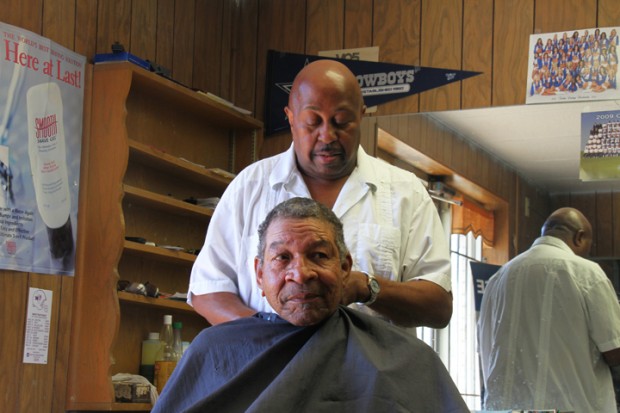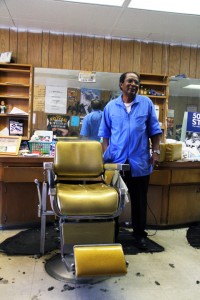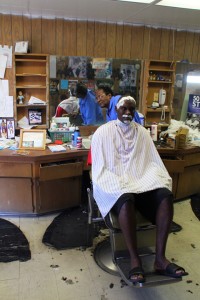
Story by Jade Mardirosian
Photos by Jeremy Rinard
A sign reads, “Welcome to Historic Elm Avenue.” It can be seen across the street from the Jockey Club Barber Shop. Worn linoleum tiles layer the floor, and faded wood paneling covers the walls. Smokey Robinson and The Miracle’s “Tracks of my Tears” plays on the radio, eerily reminding the customers at one of Waco’s oldest barber shops to take a good look at the faces of the men cutting their hair and shaving their beards, because like so many places on this once diverse and lively street, this barber shop will soon be closed.
The Jockey Club Barber Shop opened in 1917, southeast of Waco’s old square, at Second and Franklin, now the parking lot of the Hilton. The shop was forced to move to its current location on Elm Avenue in 1970 after the Federal Urban Renewal program cleared about 200 buildings, leaving only City Hall.
One of the barbers who moved from the bustling downtown location to Elm Avenue is Lloyd Dugas, who retired with the shop at the end of November. Dugas began cutting hair at the Jockey Club in 1957 after attending Tyler Barber College, where he met his wife, a native Wacoan. Because of his wife and the advice of another barber, he soon began to call Waco home.
“I came to work here because I stopped in Houston to work at a barber shop there and the barber there told me Houston was a bad place to work and he recommended me to find the Jockey Club in Waco,” Dugas said. “He thought it’d be a nice place for me to start off.”
Dugas, though in his late 70s, still stands with the posture of a young man of his craft, wearing thick ‘80s-style eyeglasses and a bright blue barber’s smock. He explains he was fond of the barbershop when he first began working there, and he reflects on how the Jockey Club and Elm Avenue have both changed over the years.
“It has changed quite a bit because when I first started working at the Jockey Club haircuts were just 65 cents – now they’re $10 – and a shave was 35 cents then. Now a shave is $6,” Dugas said.

Historic Elm Avenue has also changed significantly, with a major decline in the businesses on the once lively street since about the 1990s.
“It done changed quite a bit,” Dugas said. “Let’s see, there used to be a Safeway over there,” he said motioning to the corner, “and an H-E-B over where the library is now. When [the shop] first moved there was a lot on this street, a lot of beer joints, hotels, the post office was on this street, but it’s kind of dead now.”
Reminiscent of its vibrant past, Dugas is concerned about the sad future that may await Elm Avenue.
“I know it’s getting deader and deader. Actually most of the places are closing,” Dugas said. “Waco has gotten kind of slow now. It used to be faster (paced), it used to be like Houston or Dallas when we first moved here. [Back then] there was a lot of traffic in here, but it’s slowed up quite a bit.”
In contrast to the dwindling street on which it lies, the shop has stayed mostly unchanged and the customers continue to come through the doors, in a tradition unmarred by the slowing life of Elm Avenue.
Charles Redrick is one of the dedicated customers. He has been getting his hair cut at the Jockey Club since his last barber died, about 15 years ago.
“I’ve been knowing about it since it was down on Bridge Street.,” Redrick said. “I know a whole lot of people that come here. All my brothers come here.” Redrick comes once a month to have his hair cut by Dugas. In a picture of the shop’s progression into the next generation, he also brings his 5-year-old grandson to have his hair cut. Redrick is unsure of where he will go to have his hair cut once the shop is closed, expressing disbelief that the neighborhood staple will no longer be around.
The approaching closure of the shop comes as a price of a tragic event – the upcoming radiation to treat Dugas’ fellow barber at the shop, Charlie Harris.
Harris, who has been working at the Jockey Club for about four years, said that after having a successful surgery for colon cancer, he found out he would have to begin battling prostate cancer. Once he begins radiation, he will also retire from the shop.
Harris, a tall man with a bald head and thick black mustache, explained his medical situation with a calm sureness.
“In November, I’m going to the doctor and whenever they tell me I can start the radiation, that’s when I’m just going to call it a day,” Harris said. “We might work through November but I think after that I’m just going to go ahead and call it a day.”
With Harris gone from the shop, Dugas said he did not want to remain at the alone.
“In a way I am sad [to see the shop close], but I’m ready to retire because most of the guys I’ve worked with have passed. We worked over there [on Bridge Street] and all of them have left me,” Dugas said.
Dugas said he imagines he will miss his customers once the shop closes and he retires. His customers, like Redrick, will surely miss him.
“I don’t know what I’m going to do. There’s going to be a whole lot of people that will miss y’all,” Redrick said to Dugas and Harris.
Although he looks forward to his retirement, Dugas believes his customers will be hard pressed to find another barbershop as reliable as the Jockey Club.
“I know all the barbershops [in the neighborhood]. They’re not as consistent as this one,” Dugas said. “They don’t open on time like we do. We have a schedule we go by. Most of the other barbershops open at anytime and leave sometimes leaving the customer in the chair.”
Harris also believes the shop will be missed by the customers in the neighborhood. He says one of his favorite parts about working in a barbershop is not knowing who is going to come in.
“We will be truly missed, because [for] a lot of people this is the only shop they know,” Harris said.
“You can find another barbershop, but you can’t find the atmosphere. A lot of people don’t come because we great barbers; they come because we make them feel at home.”

Working as more than just a barber, Harris strives to connect with his customers on a personal level, often discussing topics from sports to politics.
“It’s just an atmosphere. You come in here and let your stress go,” Harris said. “You come in here and argue for an hour and when you leave all your stresses are gone.”
For Harris, it is hard to see the shop have to close since he knows the role it has played in Waco’s past.
“I kind of hate to see it go because it’s been in the neighborhood so long,” Harris said. “It would be good if someone could come along in the community and just buy it and basically you could just leave it like it is – just keep the doors open and it would be good. It’s got to be the oldest black barber shop in Waco. You hate to see a place like this just close down.”
The closing of the shop could open a whole new world for Dugas who has plans for his free time.
“Me and my wife are going to just take it easy and travel a little bit,” Dugas said. “My wife retired [recently]. She’s a beautician. She wants to take a train ride – she’s never been on a train – so I think we’ll do that.”
Looking past his radiation treatment, Harris has hopes of seeing the world beyond the little barber shop on Elm Avenue.
“I want to start traveling around a little bit here and stuff like that and then after that it’s just me and the remote control,” Harris said. “I didn’t even renew my barber license, [so] this is it. I have a bunch of memories though, so that’ll be good.”
